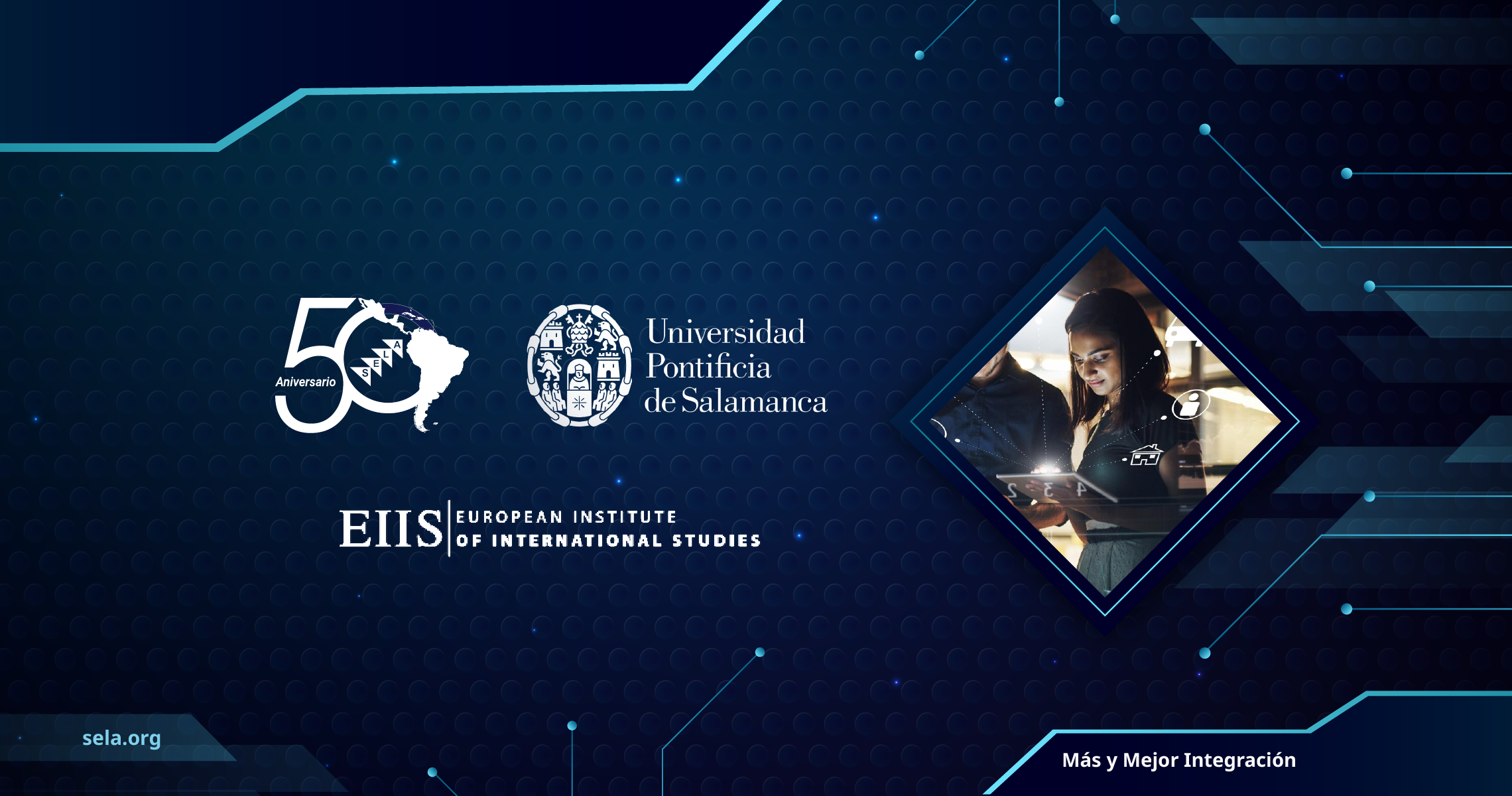
The Permanent Secretariat of the Latin American and Caribbean Economic System (SELA), in continuity with its training programme aimed at diplomats and high-level officials in areas related to diplomacy, technology and global governance, is pleased to offer this year’s course entitled “Global Technology Governance: Big Tech Companies & Artificial Intelligence”. This course is organised by SELA and the European Institute of International Studies (Sweden), in collaboration with the Institute of European Studies and Human Rights of the Pontifical University of Salamanca (Spain).
The main purpose of this course is to strengthen the negotiating skills of participants, promoting a deep understanding of the application of diplomacy in the resolution of emerging political and geopolitical challenges in the current global technological context, characterised by its complexity and dynamism. It also aims to offer specialised training to develop and consolidate the professional skills of the region’s officials, strengthening their capacity to face the challenges of the 21st century in the digital era.
The course “Global Technology Governance: Big Tech Companies & Artificial Intelligence” aims to analyse the impact of Big Tech Companies and Artificial Intelligence (AI) on the global landscape, with a particular focus on their effects on international relations, geopolitics, economics and diplomacy. The course will examine how these companies and technologies have transformed the traditional dynamics of international relations, highlighting the emergence of Techplomacy as a new foreign policy strategy. The growing dependence on these companies and their technologies has generated new forms of power, posing challenges for nation-states in areas such as digital sovereignty, cybersecurity and data control. These developments have given rise to geopolitical tensions arising from competition for leadership in the world of disruptive technologies such as artificial intelligence, generating disputes over regulation, data privacy and access to information.
In the context of the five dimensions commonly referred to in geopolitical and geostrategic studies, cyberspace has established itself as an essential domain for defence, economics and diplomacy. Therefore, it will be analysed how Big Tech Companies and artificial intelligence have profoundly transformed politics and democracy in countries, generating new challenges and opportunities. These technologies influence the formation of public opinion, access to information and government transparency, but they can also be used to manipulate elections, spread disinformation and undermine public trust. Moreover, the concentration of power in a few technology companies raises concerns about digital sovereignty and data control, which could affect the autonomy of governments and fairness in democratic processes.
| Tuesday, 20 May 2025 | |
| 08:45 – 09:00 am (Caracas time) | Welcome session
|
| 9.00-10.30 | Diplomacy in the era of artificial intelligence: new challenges and opportunities
Speaker: Ambassador José Beraún Araníbar, European Institute of International Studies (Sweden) |
| 10.30-12.00 | Big Tech Companies, artificial intelligence and international relations: Techplomacy
Speaker: Dr. Mario Torres Jarrín, Director of the Institute of European Studies and Human Rights of the Pontifical University of Salamanca (Spain) |
| 12.00-12.30 | Break |
| 12.30-14.00 | Artificial intelligence and geopolitics
Speaker: General Jesús Argumosa, Director of the Chair in Geopolitics and Strategic Studies at the European Institute of International Studies (Sweden) |
| Wednesday, 21 May 2025 |
|
| 9.00-10.30 | Regulation and global governance of artificial intelligence
Speaker: Ambassador Antonio Núñez y García Saúco, European Institute of International Studies (Sweden) |
| 10.30-12.00 | Artificial intelligence and the judiciary
Speaker: Dr. Naiara Posenato, Professor at the University of Milan (Italy) and Researcher at the European Institute of International Studies (Sweden) |
| 12.00-12.30 | Break |
| 12.30-14.00 | Challenges and opportunities for foreign services in the digital era
Speaker: Ambassador Dr. Alejandro Garofali Acosta, President of the European Institute of International Studies (Sweden) |
